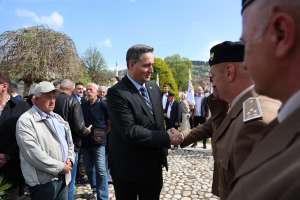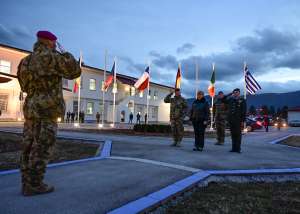SARAJEVO, October 13 (FENA) - Bosnia and Herzegovina has been working on its path to the North Atlantic Treaty Organization (NATO) since 2006, and it all went well until the invitation to send the first Annual National Program (ANP) to the headquarter of that military-political alliance came.
Interview by: Hana Imamović
Professor Mirza Smajić, Head of the Peace and Security Studies at the Faculty of Political Sciences at the University of Sarajevo, said in an interview with FENA, noting that the state has been drafting this document and sending it to NATO.
“It is a kind of scanning document that provides information in what areas the system needs improvement in order for BiH to progress towards NATO membership,” Smajić added.
He reiterated that the European Union and NATO can not be viewed separately because it is a unified system of reform processes that contribute to the well-being of BiH citizens.
The ANP is a document that has become a stumbling block for political leaders in the process of forming government at the state level, although a year has passed since the general elections, but Smajić believes that a compromise must be found in this regard.
On the one hand, there are a number of legal and doctrinal documents that have defined that there is political consensus on BiH's path towards NATO, and the last stage is the activation of the Membership Action Plan (MAP), which requires the adoption of the ANP.
But, on the other hand, without consensus, all three constituent peoples in BiH will not be able to reach full membership in NATO.
“The experience of many countries shows that they have stayed in the last phase of the MAP for ten years, and BiH is just getting into that phase. But since the country is working on the compromise of the three peoples therefore we should go in that direction,” explained Smajić.
He thinks it is necessary to accelerate the process of government formation, what the European Union and the United States as important partners of BiH have already urged, clearly stating that BiH should not, however, give up on its path to NATO and the European Union.
As Professor Smajić pointed out, it is expensive to be in NATO, but it is even more expensive to be outside that alliance because today's security interactions of the states are visible and must be implemented through certain regional or global security complexes, and the best example is NATO.
He stressed North Macedonia as an example, that after receiving the "green light" for NATO membership, there was an improvement in economic and political indicators that testified to democratic consolidation of the state and society.
“There is a positive momentum in this country and that is exactly the example why we should go in this direction,” he said.
Recognizing the importance of security issues in the world, the Faculty of Political Science will reconceptualize security studies in the future.
Smajić announces that he will actualize issues of importance for BiH, such as moving towards NATO and European Union membership and other strategic issues, with domestic and international partners, and he intends to bring all relevant actors together to discuss these topics and offer solutions.
A new study concept will be developed next year and a joint study program will be organized with the Faculty of Political Science and International Relations from Banska Bystrica, Slovakia.
As an expert of BiH's security challenges, Professor Smajić also referred to migration, recalling that it has been an issue in BiH for almost two years, but BiH has not addressed this well due to internal issues and lack of financial resources.
BiH's assistance in coping with increasing influx of migrants has been provided by the International Organization for Migration (IOM) and the European Union, and in recent days there has been a marked increase in the number of migrants in the Tuzla region.
Smajić expressed his satisfaction with the humane treatment of migrants, although certain politicians tried to put the issue on a daily political platform in order to provoke a certain fear, they failed to do so.
“However, this issue needs to be addressed from the humanitarian as well as the security aspect, and in this process, the engagement of the state of BiH in cooperation with lower levels of government is most expected,” Head of the Peace and Security Studies at the Faculty of Political Sciences at the University of Sarajevo, Professor Mirza Smajić concluded in an interview with FENA.
(FENA) A. B.











